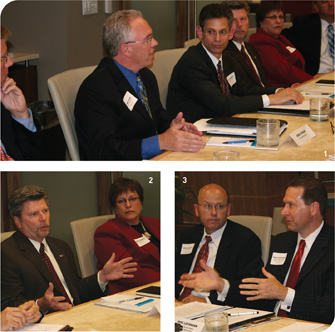
1: Community banks, with less than $1 billion in assets, are most at risk in the new regulatory environment, said Greg Bynum, center. | 2. Tim Petty said US Bank had plenty of capital, but loan demand was low. | 3. Mike Lochmann,right, said TARP undercut big banks' political clout.
“There could not be a worse time in the history of banking to add these restrictions than now,” said Paul Holewinski. Investors will have to start looking at returns on assets and equity that are significantly lower because of the additional costs from the expense side of the bill. “It seems like we’ve gone through a perfect storm,” said Holewinski, “and we’re getting a bill here that is going
to continue us on in that perfect storm.”
John Dicus noted that politicians
may be demanding that banks make more loans, but regulators are not. “I mean, it’s two different messages.”
“We want to make good loans,” said Julius Madas. “That’s really what most of us do. That’s really what drives our organizations. But we do need an environment here that can allow us to be
able do those things.”
An additional concern, cited by John Dicus, is the time lag between when a law is passed and when the ensuing regulations take effect. “You will have examiners who come in a year or two from now and look at what you’ve done to date and say, ‘Well, you weren’t in compliance with the future rules and regs.’” Mike Lochmann worried about the “institutional atrophy” that comes from such uncertainty.
As Tim Petty, executive vice president of US Bank explained, traditional banks like his are continuing to do the kind of loans they have always done: mortgages, autos, and the rest. “We’ve got the capital. We’re certainly putting it out. And we’d love to see more demand, business as well as consumer.” That demand, however, depends on increased economic activity.
“It’s really a demand issue, rather than a supply issue,” affirmed Mark Hargrave. Many of the bankers he has talked to have told him that the problem is not just with new loans, but with their existing lines of credit, many of which are at record low utilization percentages.
“That’s why we're sitting on so much liquidity,” said Julius Madas. Businesses, he said, “don’t see opportunities to expand, create jobs, which is what drives the opportunity for the consumer to go out and buy a new car or new home.” Madas did not see any relief coming in Dodd-Frank. “Instead of addressing issues that help create jobs and help our economy,” he said of Congress, “I think they dropped the ball.”
When asked why bankers did not do a better job of communicating their frustration about the impending legislation, Mike Lochmann suggested that the biggest banks took or were force-fed a good deal of TARP money, “and they didn’t have any political clout when they had to pay it back.”
Mortgage Lending
Kevin Cook noted that, according to reports, the Home Mortgage Disclosure Act requires that lenders report some 20 additional characteristics. He wondered how that was going to affect a bank’s willingness to engage in mortgage lending.
As Tim Petty explained, US Bank is among the top 10 nationwide in mortgage origination. That business has grown within the bank in the past few years as outside competitors have faded away. “I don’t think our model is going to change from wanting to continue to serve the client and the customer in home mortgage origination,” said Petty. “The new bill may slow down the process and, yes, it may be more onerous, but we’re used to a regulatory environment.”
Large banks like US Bank have the depth and the ability to deal with an increased regulatory burden, said Karen Garrett, but smaller banks don’t have the resources to manage the increased compliance obligations.
“We don’t have US Bank’s staff,” confirmed Greg Bynum. “We have quite a bit of volume, but not enough to really do it all properly.” As Bynum explained, it will be very difficult for smaller banks to honor all the new regulations, which could result in various penalties. In the end, however, “It’s the consumers who get the bad deal.”